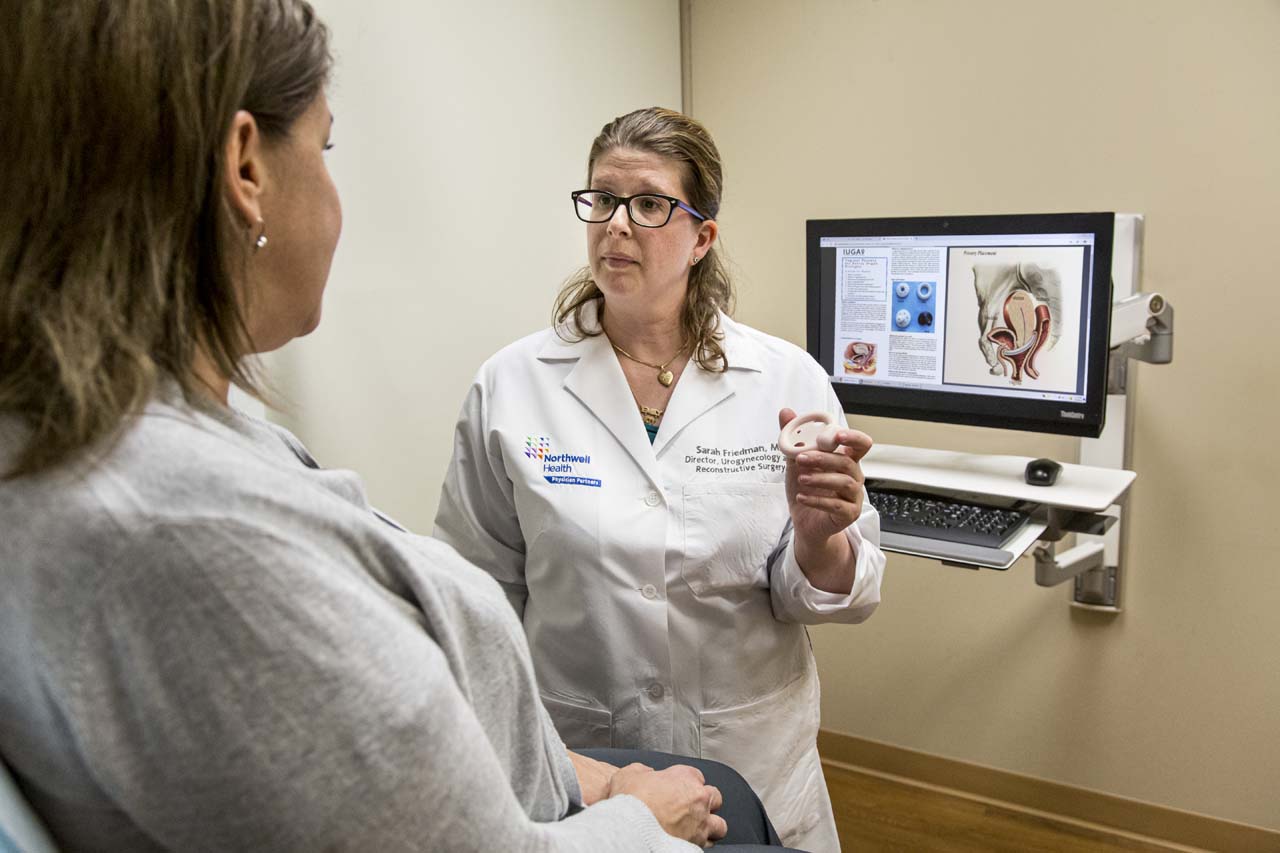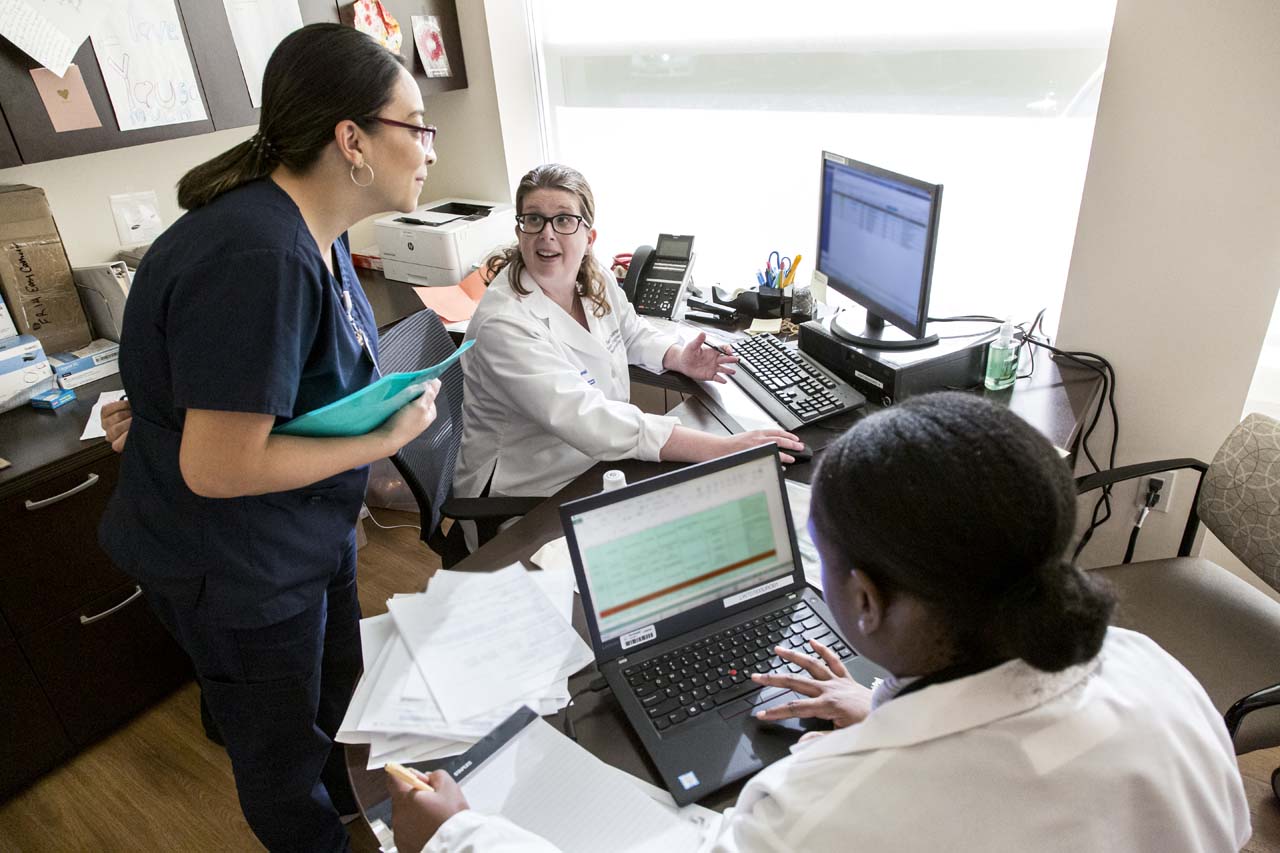SIUH’S DIVISION OF UROGYNECOLOGY’S REMARKABLE RANGE OF TREATMENTS FOR PELVIC FLOOR DYSFUNCTION
BY JESSICA JONES GORMAN • PHOTOS © AMESSÉ PHOTOGRAPHY
Under reported and often undiagnosed, pelvic floor dysfunction is a medical condition experienced by women that is clinically defined as the inability to correctly tighten and relax the network of muscles, ligaments, and tissues in the lower abdominal area that act like a hammock supporting the uterus, vagina, and rectum. Symptoms of this disorder include constipation, urine or stool leakage, and a frequent need to urinate. And while studies have shown that one in three women struggle with this condition, many do not seek treatment because they either get used to the symptoms (which develop gradually) or are simply too embarrassed by their private nature. To further complicate matters, women often believe the condition cannot be corrected.

But now, a team of medical professionals at Staten Island University Hospital is addressing these issues and placing female pelvic medicine and reconstructive surgery at the forefront of gynecological care.
“Our patients generally have issues urinating their bladders do not empty entirely and they are often diagnosed with recurrent urinary tract and vaginal infections,” noted Dr. Sarah Friedman, director of the division of urogynecology and pelvic reconstructive surgery at SIUH. “A variety of pelvic floor disorders can be the cause that’s when the organs prolapse or begin to fall because the pelvic muscles and tissues can no longer support them. Incontinence ensues, and women can experience leakage when they cough, sneeze, laugh, or exercise. The condition also causes overactive bladder, which creates urgency and frequency. We also treat painful bladder syndrome and manage fecal incontinence, which is categorized as leakage of stool. Sexual dysfunction, painful intercourse, and any type of pelvic pain also fall into our realm.”
Pelvic floor disorders are caused by tears, weakness, or poor function of the muscles and nerves in the pelvic floor all of which can be corrected. According to Friedman, a range of innovative treatment options are creating a radical change in the specialty.
“At SIUH, we offer management options that are FDA approved and have been the subject of numerous studies that proved their efficacy and risk profile,” she noted. “There is a lot of innovation out there, but we only offer treatment options that we fully stand behind.”

Many of them are groundbreaking. Friedman said she was the first provider on Staten Island to offer neurostimulation, a procedure in which a pacemaker implanted in the lower back helps patients regain bladder control. It is an innovative way of controlling urinary incontinence, frequency issues, and problems emptying the bladder; it works by sending mild electrical pulses to the sacral nerves that help control bladder function.
Friedman also offers a procedure called percutaneous tibial nerve stimulation, or PTNS, a low risk and non-surgical treatment that works by indirectly providing electrical stimulation to the nerves responsible for bladder and pelvic floor function. It involves the placement of a slim needle near the tibial nerve at the ankle. Impulses travel to the sacral nerve plexus, and the treatment addresses both urinary urgency and fecal incontinence.
“My patients range from young, active women to the most elderly who are dealing with urinary symptoms and incontinence, pelvic organ prolapse, fecal incontinence, and birth injury,” said Friedman. “We fix conditions like atrophy of the vagina, infective cystitis, labial adhesions, prolapse of the urethra, and vulvar diseases. Most of our treatment options are minimally invasive or robotic, and we are skilled in management options that are unfamiliar to even the most educated providers. Our goal is to stay current with new surgical innovations and to make educated decisions about our patients’ care based on the latest research and data.”
Friedman, a graduate of SUNY Downstate College of Medicine, did residencies at Albert Einstein College of Medicine’s Yeshiva University as well as fellowships at Johns Hopkins Bayview Medical Center and the Greater Baltimore Medical Center. She joined the staff at SIUH in January 2018 with a goal of establishing and strengthening the division of urogynecology. In addition to her role at SIUH, she serves as an assistant professor at the Donald and Barbara Zucker School of Medicine at Hofstra/Northwell.

“I pursued this subspecialty because it was really important for me to improve women’s quality of life,” she said. “Pelvic floor disorders are quite common, but women don’t talk about them. My practice aims at informing women that they don’t have to live with these problems. There are management options. So many of my patients are completely surprised when the quality of their lives improves.”
“In the future we anticipate the need for correction of pelvic floor disorders will increase exponentially,” added Friedman. “That’s why this innovation is so ground breaking: The need for pelvic reconstruction is predicted to triple as baby boomers age.”
Despite all the surgical advances, surgery is not always necessary. Friedman also explained that there are medicines available to treat these disorders.
“There are so many different options,” she said. “And once a patient identifies that, it’s very empowering. Quality of life is so important there is no reason to feel uncomfortable, embarrassed, or worried on a daily basis. We have a team approach here, and together our goal is to educate women about their options. Urinary issues and fecal incontinence are serious problems that should be addressed. Putting an end to these disorders is life altering.”

Sarah Friedman, MD
Urogynecology and Reconstructive Surgery
900 South Avenue, Staten Island, NY 10314
718.226.2533 / northwell.edu
